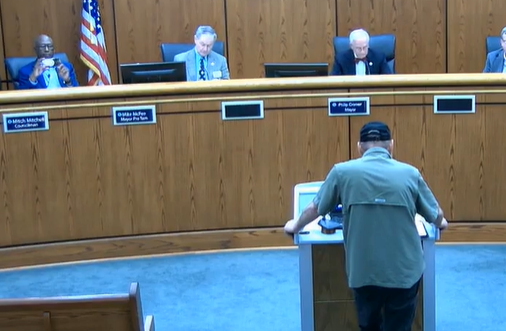Patrick Canning, Beaufort resident, waited until 2 hours and 9 minutes into the City Council meeting to make his public comment on March 11, 2025. Councilman Mitch Mitchell and City Manager Scott Marshall were in Canning’s crosshairs for recent partisan political activism against President Trump. Canning argued that both the behavior of Mitchell and Marshall violates ethical and conduct standards for their positions. “Like it or not, we have an election process in this country where a Republican president has been duly elected, winning the electoral college as well as the popular vote.”
Councilman Mitchell in Military Uniform at a Political Protest
Canning took issue with Councilman Mitchell wearing his military uniform during a political protest. While Councilman Mitchell videotaped with his cell phone from his seat at the March 11 City Council Meeting, Canning said, “In my opinion, this gives the appearance of a violation of Beaufort City ethics code and the non-partisan city council. Additionally, it appears to be a clear violation of the DoD 1334.01 “Wearing of the Uniform”.” In paragraph 1.2.(2) of DOD Instruction 1334.01 it clearly states military uniforms are not to be worn “during or in connection with furthering political activities”.
Along with having the back up of military and city policy, it seems Canning struck a nerve with Councilman Mitchell. A few minutes later (2:24:30) in the meeting during his comments, Mitchell gave a lengthy impassioned response to Canning’s comments. Mitchell started out saying, “It pains me to see where my country is … still mired in” race centric conversations, referring to recent executive orders signed by President Trump that are aimed at curtailing Diversity, Equity, and Inclusion (DEI) activities and initiatives. Mitchell cited his 40 year military career and said, “It’s my uniform, I’ll wear it whenever I want.” He said he wore his uniform to make a statement: “Can we just be a country that respects each other? And if we can’t respect each other, just leave me alone.”
City Manager Scott Marshall’s Political Comments on Facebook
Patrick Canning continued his public comments by highlighting City Manager Scott Marshall’s controversial Facebook posts, in which Marshall referred to President Trump as a “bullying thug” and expressed hope that the “ghosts of Lincoln and Reagan choke [Trump] in his sleep.” Canning argued that these remarks were more than just heated rhetoric, stating, “Some may want to brush this off as a euphemism, but I believe Scott Marshall was clearly voicing his personal hate and contempt for our President, Donald Trump.” He then questioned whether Marshall harbored similar disdain for Beaufort residents who support Trump, asking, “Should we expect that he would have a personal bias against others in our community?” Canning also pointed out that Marshall’s comments directly violate the City’s Code of Conduct.
On page 24 of the City of Beaufort Employee Handbook there is a policy specific to employees’ social media use :
“Employees are cautioned that they are responsible for the contents of social media posts they make. Posts that contain obscene or harassing material, … that reasonably call into question the employee’s judgment, or that reasonably cause concern among the public may result in discipline, up to and including termination from employment.”
On page 15 the employee Code of Conduct states:
“Employees must make an effort to avoid any actions creating the appearance that they are violating the law or the ethical standards promulgated pursuant to policy”
Expectations of the Beaufort City Manager are specified in the Beaufort City Council Standard Operating Procedures Manual: “7.01 – The City Manager is subject to a professional code of ethics as a member of the International City/County Management Association (ICMA). It should be noted that this code binds the City Manager to certain practices that are designed to ensure actions are in support of the City’s best interests. Violations of such principles can result in censure by ICMA.” The ICMA Code of Ethics is clear about expectations for City Managers when it comes to public behavior and political activism:
“Tenet 2. Affirm the dignity and worth of local government services and maintain a deep sense of social responsibility as a trusted public servant.
Tenet 3. Demonstrate by word and action the highest standards of ethical conduct and integrity in all public, professional, and personal relationships in order that the member may merit the trust and respect of the elected and appointed officials, employees, and the public.
Public Confidence. Members should conduct themselves so as to maintain public confidence in their position and profession, the integrity of their local government, and in their responsibility to uphold the public trust.
Influence. Members should conduct their professional and personal affairs in a manner that demonstrates that they cannot be improperly influenced in the performance of their official duties.
Tenet 7. Refrain from all political activities which undermine public confidence in professional administrators.
Personal Advocacy of Issues. Members share with their fellow citizens the right and responsibility to voice their opinion on public issues. Members may advocate for issues of personal interest only when doing so does not conflict with the performance of their official duties.”
Lingering Questions
At the end of Canning’s March 11 public comments, he asked a question that a lot of Beaufort residents are asking: “Should we expect more of this type of activism?”
Ultimately, the controversy surrounding Councilman Mitchell’s actions and City Manager Scott Marshall’s comments raises concerns about political activism within Beaufort’s leadership. The city’s ethics code and non-partisan governance structure are intended to ensure that public officials uphold the trust of all residents, regardless of political affiliation.
It is unclear whether either Mitchell or Marshall have been addressed or disciplined. But Canning’s remarks put a spotlight on the role of personal political beliefs in public service, and whether those in leadership positions should be held accountable for conduct that may compromise their impartiality. Beaufort residents are left wondering—will city officials maintain professionalism and neutrality, or will personal politics continue to blur the lines of ethical governance?



